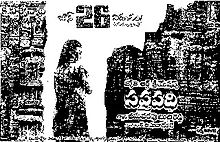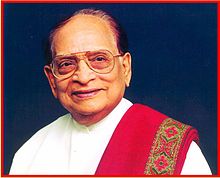Saptapadi (1981 film)
Saptapadi English Seven Steps is a 1981 Telugu drama film, written and directed by Kashinathuni Vishwanath. The film garnered the Nargis Dutt Award for Best Feature Film on National Integration. The film is not only about the seven steps that one takes to become a part of the institution of marriage and a ritualistic exercise that completes the act of shedding the bachelorhood and entering a more stable state, but talks about an individuals journey breaking away from the shackles from the conservatism to finding a path of understanding, encompassing and enlightenment. The film was premiered at the International Film Festival of India, and the AISFM film festival.
He is well into his twilight years which give him even more reason to not mend his ways. In his footsteps follows his Gaurinadha grandchild from his son, gearing up to be a head priest at the local temple. Yajulus will prevails over Hemas grandchild from his daughter wish and Gauri and Hema end up being married. However, Hema is secretly in love with a flutist, who is not of her caste. The brilliance of Viswanath comes full fore at this point, when on the first night, Gauri witnesses Durga devi in Hema, and walks out of the room completely shaken up. Gaurinadha, being an ardent devotee of the Devi, realizes that his wife is in love with another man, hence she is like a mother to him, nothing more, nothing less. This act of God triggers Yajulus thought process to seriously question, for the first time in his life, the validity of his position on matters that involve caste, creed and religion, justifying the steps that Yajulu takes one a time, from the first one in trying to understand Hemas real interests till the last one, when he sees her off with her love interest on the boat.The crux of the whole film is contained in a beautiful conversation that happens between the characters played by Allu Rama Lingaiah and J.V. Somayajulu. Is caste a necessary evil? Is it evil in the first place? If the original idea that dharmam vrutthi dharmam in this case, than mano dharmam, meaning, nobody is born as one pertaining to a caste. It is his duties that make him one dictates the caste of an individual, isnt it abnegation of ones own dharmam when one denounces his own caste? If structure in the form of division of duties was the primary reason why caste was created in the first place, isnt it working against the same individual to be caught up completely in the structure that he himself created? WhichWho controls what here? ........
Source: Wikipedia



